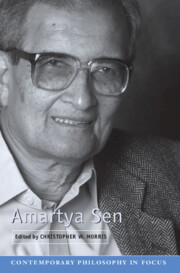Book contents
- Frontmatter
- Contents
- Contributors
- Preface
- Introduction
- 1 Preference, Choice, and Rationality
- 2 Ethics and Economics
- 3 Capability and Agency
- 4 Freedom in the Spirit of Sen
- 5 Social Choice Theory and the Informational Basis Approach
- 6 Sen on Sufficiency, Priority, and Equality
- 7 Famine, Poverty, and Property Rights
- 8 Development
- Selected Bibliography
- Index
- References
2 - Ethics and Economics
Published online by Cambridge University Press: 05 June 2012
- Frontmatter
- Contents
- Contributors
- Preface
- Introduction
- 1 Preference, Choice, and Rationality
- 2 Ethics and Economics
- 3 Capability and Agency
- 4 Freedom in the Spirit of Sen
- 5 Social Choice Theory and the Informational Basis Approach
- 6 Sen on Sufficiency, Priority, and Equality
- 7 Famine, Poverty, and Property Rights
- 8 Development
- Selected Bibliography
- Index
- References
Summary
Almost all of Amartya Sen's work has been, broadly speaking, about “ethics and economics”. Sen's professional reputation rests in large part on work in normative areas of economics, welfare economics, and social choice theory, and on helping to restore “an ethical dimension to economics and related disciplines” (Nobel Committee 1998). His interests in poverty, justice, and development clearly are ethical. And, he has also made some substantial contributions to moral theory understood narrowly. In a way, virtually all of the chapters of this book take up topics in “ethics and economics”.
My main concern in this chapter will be about the relation between the two, ethics and economics, and, in particular, the pressure that economics puts on ethics. Sen has long been concerned about the distance between the two fields of inquiry and has argued that “modern economics has been substantially impoverished by the distance that has grown between economics and ethics” (Sen 1987: 7). He thinks that the consequences to economics, both to the subfield of welfare economics and to the core predictive theory, have been serious (Sen 1987: 57).
SKEPTICISM ABOUT ETHICS
Economists in the twentieth century have often been skeptical about inquiries about value quite generally. They often have been concerned, first of all, to keep their field free of all normative elements, ethics included, so that it could be a “value-free” science.
- Type
- Chapter
- Information
- Amartya Sen , pp. 40 - 59Publisher: Cambridge University PressPrint publication year: 2009



